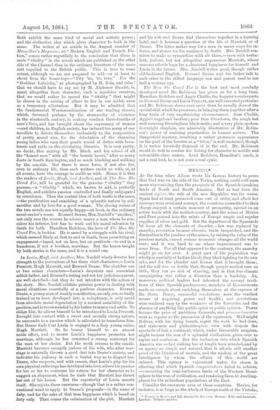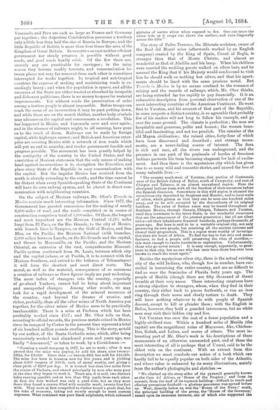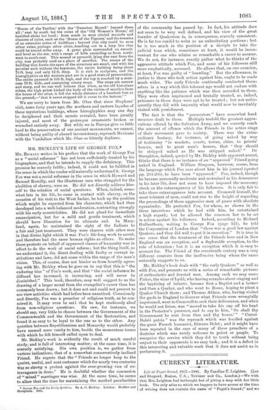MEXICO.* Ar the time when Alison wrote his famous history
to prove that God was on the side of the Tories, nothing could well seem more unpromising than the prospects of the Spanish-speaking lands of North and South A merica. Bad as had been the ancient regime, the rule of the new Republics was far worse• Spain had at least preserved some sort of order, and albeit her viceroys were cruel and corrupt, the countries committed to their charge enjoyed a certain measure of prosperity, carried on an active trade with the mother-country, and the mines of Mexico and Peru poured into the mints of Europe ample and regular supplies of silver and gold. But the departure of the Spaniards let loose all the elements of disorder,—law was replaced by anarchy, revolution became chronic, trade languished, and the diminution in the produce of the mines, by raising the value of the precious metals, caused serious economic changes all the world over; and it was hard to see where improvement was to come from. For all that appeared to the contrary, the anarchy might go on for ever. A great part of the population was wholly or partially of Indian blood; they liked fighting for its own sake, and for the plunder and license that it brought them ; and the soil was so fertile that, though people worked ever so little, they ran no risk of starving, and in that fine climate campaigning was rather a diversion than a hardship. As, moreover, political leaders had inherited the corrupt tradi- tions of their Spanish predecessors, members of Governments made no scruple about enriching themselves at the expense of the State. Hence, successful revolutions were the readiest means of acquiring power and wealth ; and revolutions were rendered easy by the weakness of the Executive and the absence of anything like public spirit or public opinion. Power became the prize of ambitious Generals, and pronunciamentos were as regular as the precession of the equinoxes. Well might Bolivar, with his dying breath, regret the work he had done, and statesmen and philanthropists view with despair the spectacle of half a continent, which, under favourable auspices, might become the seat of a splendid civilisation, given over to rapine and confusion. But the barbarism into which Spanish America was so fast sinking has at length been arrested, and by an agency so simple and natural, that it affords still another proof of the blindness of mortals, and the wisdom of the great Intelligence by whom the affairs of this world are ordered. This agency is vapourised water, for steam is effecting that which Spanish conquistadores failed to achieve, —converting the semi-barbarous lands of the Western Hemi- sphere to the uses of civilisation, and rendering them fit dwelling- places for the redundant populations of the East.
Consider the enormous area of these countries. Mexico, for instance, is as large as the whole of Europe south of the Vistula;
• Travels in Mexico, and Life Among the Africans. Elston : E3103 and Lanriart. London : Trabner and Co. and thence to Manzanillo, on the Pacific ; and the Mexican this were enough to excite hundreds to exploration. Unfortunately,. Oriental, an extension of the vast, comprehensive Missouri- those who go never return ! It is easy enough, apparently, to pens- Pacific system southward from St. Louis, between which city trate to that city, but no one who has once been there has ever been and the capital (where, or at Puebla, it is to connect with the known to reach the coast again."
Mexican Southern, and extend to the Isthmus of Tehuantepec) Besides the mysterious silver city, there is the actual existing it will form the shortest and most direct route. The city of the wild Indians, who, though few in number, have sue- moral, as well as the material, consequences of so enormous ceeded in terrorising the entire country, and are as difficult to a creation of railways as these figures imply are past reckoning. find as were the Seminoles of Florida forty years ago. The The mere influx of strangers into the country, especially people of Merida (though there are fifty thousand of them) and unexpected changes. Among other results, we may a strong objection to strangers, whom, when they find in their
country, they either back to pieces forthwith, or run an iron look for a rapid development of the mineral resources of•
the country, vast beyond the dreams of avarice, and richer, probably, than all the other mines of North America put will have nothing whatever to do with people of Spanish together, for the silver mines of Mexico seem to be practically descent, except to kill or plunder them ; with the English in inexhaustible. There is a mine at Pachuca which has been Belize, however, they hold a guarded intercourse, but no white profitably worked since 1557; and Mr. Ober tells us that, man may visit their hidden city and live. according to official records, the precious metals coined in Mexico Yet Yucatan was once the seat of a dense population and a finally "denounced," or taken to work, by a Cornishman :—
"Forming a small company in 1877, he set to work ; after it was most interesting of all is perhaps that of Uxmal, said to be the proved that the mine was paying, he sold his share, nine twenty- oldest ruin on the continent. With an extract from this fifths, for £3,000. Since then one twenty-fifth has sold for £16,000. description we must conclude our notice of a book which can The mine has been in bonanza now for five years, and is yielding hardly fail to be equally popular on both sides of the Atlantic, about 3,000 cargoes of 300 lb. each of metal weekly, and giving a clear profit of £200 per day. It is located less than two miles from and whose value is enhanced by its many illustrations, mainly the centre of Pachuca, and owned principally by men who were poor from the author's photographs and sketches at the time they began to work it. There are, it is said, two distinct " We climbed up the steep sides of the pyramid generally known lodes running parallel, and at less than fifty yards from each other. as the Casa del Adirno, or 'House of the Prophet ;' and from its At first the vein worked was only a yard wide, but as they wont summit, from the roof of its topmost building—difficult to reach and down they found a cavern filled with metallic much, twenty-four feet offering precarious foothold—a glorious panorama was spread before wide. They were at first compelled to timber round a great deal, for
since its conquest by Cortes to the present time represent a total highly-civilised race. Within a hundred miles of Merida (the of six hundred million pounds sterling. This is the story, as told capital) are the magnificent ruins of Mayassan, Ake, Chichen- by our author, of the Santa Gerbudis mine, which, after being Itza, Kabah, and Labna, and scores of others. The most in- successively worked and abandoned years and years ago, was
Venezuela and Peru are each as large as France and Germany globules of native silver when exposed to fire. One can trace the put together ; the Argentine Confederation possesses a territory silver lode as it crops out above the surface, and runs diagonally only a little less than half the size of Russia in Europe; and the across the hills." little Republic of Bolivia is more than four times the area of the The story of Pedro Terreros, the illiterate muleteer, owner of Kingdom of Great Britain. In countries so vast neither efficient the Real del Monte mine (afterwards worked by an English. government nor steady progress is possible without good company) created by the King of Spain, Count of Regla, is roads, and good roads hardly exist. Of the few there are, stranger than that of Monte Christo, and almost as scarcely any are practicable for carriages ; in the rainy wonderful as that of Aladdin and his lamp. When his children season they become muddy torrents, and communication be- were married the wedding guests walked on silver bars, and he tween places not very far removed from each other is sometimes assured the King that if his Majesty would condescend to visit interrupted for weeks together. In tropical and sub-tropical him he should walk on nothing but silver, and that his apart- countries the expense of making and maintaining roads is ex- ments should be lined with the same precious metal. But ceedingly heavy ; and when the population is sparse, and all the Travels in Mexico is by no means confined to the romance of revenues of the State are either wasted or absorbed by incapable mining and the records of railways, which, Mr. Ober thinks, and dishonest politicians, there is no money to spare for material are being extended far too rapidly to pay financially. It is an improvements. Yet without roads the preservation of order exhaustive description from personal observation of one of the among a lawless people is almost impossible. Before troops can most interesting countries of the American Continent. He went reach the scene of an insurrection it may be past putting down, first to Yucatan, and his account of that part of the Republic, and while these are on the march thither, another body of rebels in some respects a distinct country, is so agreeable that probably may advance on the capital and consummate a revolution. This few of his readers will not long to follow his example, and go has happened in Mexico and Venezuela over and over again ; over the same ground. The climate is perfection ; the men are and in the absence of railways might, to all seeming, have gone hospitable and generous, polite and honest ; the women bean- on to the crack of doom. Railways can be made by foreign tiful and fascinating, and not too prudish. The remains of the capital, while highways cannot; and British and American enter- old Mayan civilisation ; the ruined cities, forty-four of which prise are covering Mexico with a network of iron roads which have been discovered and described ; and strange monti- will put an end to anarchy, and render government feasible and meats, are a never-failing source of interest. The flora progress possible. The movement has been greatly helped by is rich and rare, all the rivers run underground, and the the contiguity of the country to the United States, and the presence in one part of the peninsula of hordes of ferocious conviction of Mexican statesmen that the only means of making Indians prevents life from becoming stagnant for lack of excite- head against insurrections is to strengthen the Executive, and meat. And then there is the mysterious city which has given place every State of the Republic in easy communication with rise to so many wild and romantic stories, and caused the loss of the capital. But the impulse Mexico has received from the many valuable lives :- north is already extending to the south ; and the time cannot be "The country south-west of Yucatan, that portion of Guatemala far distant when every Spanish-speaking State of the Continent west of the British Colony of Belize, south of Campechy, and east of will have its own railway system, and be placed in direct com- Chiapas and Tabasco, is an almost unexplored region. Here theaboriginal Indians roam with all the freedom of their ancestors before munication with neighbouring countries. the Spanish dominion. Somewhere in this wild region is situated the On the subject of Mexican railways, Mr. Ober's Travels in mysterious city described by Stephens and Morelet, said to have walls Mexico contain much interesting information. Since 1877, the of silver, which glisten so that they can be seen one hundred miles away, and to be still occupied by the descendants of its original Government has granted concessions for the making of nearly builders. The ruins of former races may be traced throughout all 8,000 miles of road, and the roads completed or in course of Southern Mexico, through Oaxaca, Chiapas, Tabasco, and Yucatan, construction comprise a total of 5,900 miles. Of these, the longest until they terminate in the latter State, in the wonderful structures and most important are the Mexican Central (1,215 miles that are the amazement of the present generation ; but all are silent cities—all their inhabitants departed hundreds, perhaps thousands, of long) from El Paso, on the Rio Grande, to the city of Mexico, years ago. But here is said to be a veritable original city, not only with branch lines to Tampico, on the Gulf of Mexico, and San preserving its own people, but retaining all the ancient customs and Bias, on the Pacific; the Mexican National (with branches, rites of their progenitors. This is a region more worthy of investiga- 2,000 miles) between Laredo, on the Rio Grande and the capital,
tion than the heart of Africa. To find the key to lost arts and menu-
factures, to find a people still preserving the rites of sacrifice,— and thence to Manzanillo, on the Pacific ; and the Mexican this were enough to excite hundreds to exploration. Unfortunately,. Oriental, an extension of the vast, comprehensive Missouri- those who go never return ! It is easy enough, apparently, to pens- Pacific system southward from St. Louis, between which city trate to that city, but no one who has once been there has ever been and the capital (where, or at Puebla, it is to connect with the known to reach the coast again."
it will form the shortest and most direct route. The city of the wild Indians, who, though few in number, have sue- tremble at their very name. These interesting creatures have go-ahead Yankees, cannot fail to bring about important ring through their noses and slowly torture to death. They
monuments of an otherwise unrecorded past, and of these the
recasting part of Mr. Ober's work is his descriptions of these
House of the Turtles,' with the Nameless Mound' beyond them all ;' east by south lay the ruins of the Old Woman's House,' all tumbled about her head ; from south to west circled mounds and clusters of ruins, such as the 'House of the Pigeons,' and the remains of an extensive series of buildings ; beyond this city could be seen other ruins, perhaps other cities, reaching out in a long line that could be traced miles away. A great plain surrounded us, smooth and level as the sea, with a range of hills encircling us from north- west to south-east. This mound or pyramid, lying due east from the city, was probably used as a place of sacrifice. The rooms of the building that forms the apex of the structure are small, and with the peculiar arch without the keystone, the entire building being about 70 ft. long and only 12 ft. deep. It is rich in sculpture, and the hieroglyphics on the western part are in a good state of preservation. The entire pyramid is 105 ft. high, and the top is reached by a stair- case 70 ft. wide, and containing ninety steps. The steps are narrow and steep, and we can well believe that when, as the old historians relate, the high priest kicked the body of the victim of sacrifice from the house of the altar, it fell the whole distance of a hundred feet to the ground,—' that it never stopped till it came to the bottom.' "
We are sorry to learn from Mr. Ober that since Stephens' visit, some forty years ago, the northern and eastern façades of these mysterious buildings, whose hieroglyphics may one day be deciphered and their secrets revealed, have been greatly injured, and most of the grotesque ornaments broken or wrenched entirely away. But while we in Europe give so little heed to the preservation of our ancient monuments, we cannot, without being guilty of absurd inconsistency, reproach Mexicans with the Vandalism which Mr. Ober so bitterly deplores.




































 Previous page
Previous page